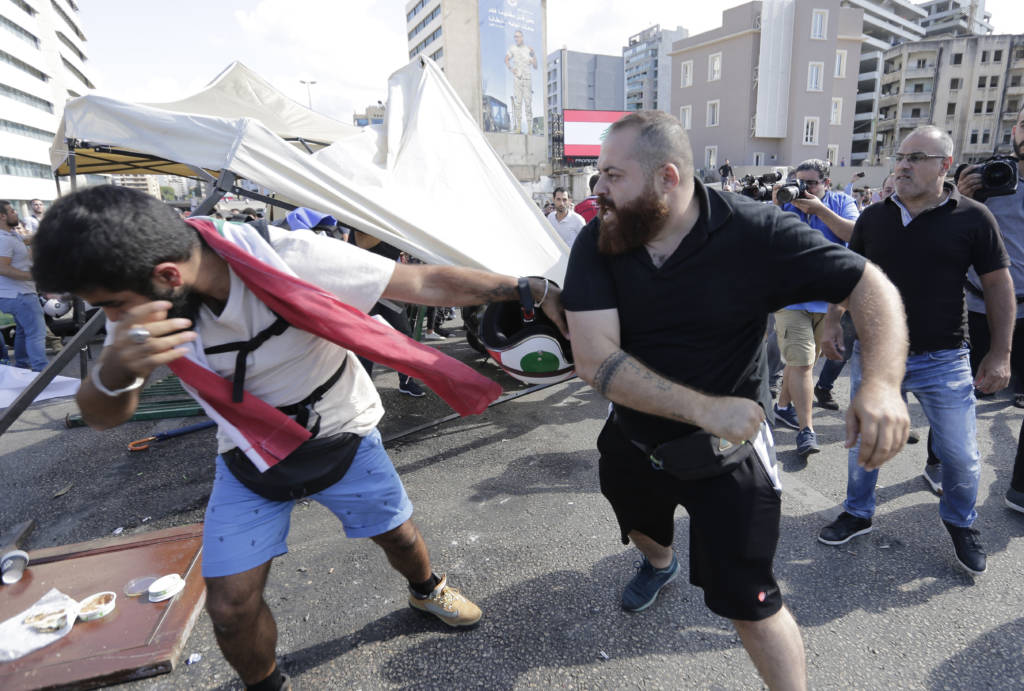The Lebanese prime minister and cabinet stepped down in the wake of the Beirut explosion, but Israeli Defense Minister Benny Gantz warned the Hezbollah terror group still threatens Lebanon.
By Associated Press
Lebanon’s prime minister stepped down from his job on Monday in the wake of the disastrous Beirut port explosion that triggered public fury, saying he has come to the conclusion that corruption in Lebanon is “bigger than the state.”
In a brief televised speech after three of his ministers resigned, Prime Minister Hassan Diab said that he is taking “a step back” so he can stand with the people “and fight the battle for change alongside them.”
“I declare today the resignation of this government. May God protect Lebanon,” he said, repeating the last phrase three times.
Israeli Defense Minister Benny Gantz drew a line Monday between the blast and claims that Hezbollah stores its rockets and weapons deep inside civilian areas.
While he did not accuse Hezbollah and its arms of being linked to the blast, Gantz reminded the world that villages and towns across Lebanon were packed with Hezbollah arms that, if set off, would destroy homes. Hezbollah is Lebanon’s biggest problem, he added.
The Lebanese government’s resignation risks opening the way to dragged-out negotiations over a new Cabinet amid urgent calls for reform. It follows a weekend of anti-government protests in the wake of the Aug. 4 explosion in Beirut’s port that decimated the facility and caused widespread destruction, killing at least 160 people and injured about 6,000 others.
The moment typified Lebanon’s political dilemma. Since October, there have been mass demonstrations demanding the departure of the entire sectarian-based leadership over entrenched corruption, incompetence and mismanagement.
But the ruling oligarchy has held onto power for so long — since the end of the civil war in 1990 — that it is difficult to find a credible political figure not tainted by connections to them.
Diab blamed corrupt politicians who preceded him for the “earthquake” that has hit Lebanon.
“They (political class) should have been ashamed of themselves because their corruption is what has led to this disaster that had been hidden for seven years,” he added.
“I have discovered that corruption is bigger than the state and that the state is paralyzed by this (ruling) clique and cannot confront if or get rid of it,” Diab, who was a university professor at the American University of Beirut before he took the job.
Although Diab’s resignation had appeared inevitable after the catastrophe, he seemed unwilling to leave and only two days ago made a televised speech in which he offered to stay on for two months to allow for various factions to agree on a roadmap for reforms. But the pressure from within his own Cabinet proved to be too much.
Diab’s government was formed after his predecessor, Saad Hariri, stepped down in October in response to the demonstrations. It took months of bickering among the leadership factions before they settled on Diab.
His government, which was supported by the Hezbollah terror group and its allies and seen as one-sided, was basically doomed from the start, tasked with meeting demands for reform but made up of all the factions that reformers want out.
Starting Over
Now the process must start again, with Diab’s government in a caretaker role as the same factions debate a new one.
“I hope that the caretaking period will not be long because the country cannot take that. Lets hope a new government will be formed quickly,” Public Works Minister Michel Najjar told reporters. “An effective government is the least we need to get out of this crisis.”
The weekend protests saw clashes with security forces firing tear gas at protesters.
The explosion is believed to have been caused by a fire that ignited a 2,750-ton stockpile of highly volatile ammonium nitrate. The material had been stored at the port since 2013 with few safeguards despite numerous warnings of the danger.
The result was a disaster Lebanese blame squarely on their leadership’s corruption and neglect. Losses from the catastrophic blast are estimated to be between $10 billion to $15 billion, with nearly 300,000 people left homeless.
The last decision taken by Diab’s government before its resignation was to refer the case of the explosion to the Supreme Judicial Council, which handles crimes infringing on Lebanon’s national security as well as political and state security crimes. The Supreme Judicial Council is Lebanon’s top judicial body.
A judge on Monday questioned the heads of the country’s security agencies. Public Prosecutor Ghassan El Khoury questioned Maj. Gen. Tony Saliba, the head of State Security, according to state-run National News Agency. It gave no further details, but other generals are scheduled to be questioned.
About 20 people have been detained after the blast, including the head of Lebanon’s customs department and his predecessor, as well as the head of the port. Dozens of people have been questioned, including two former Cabinet ministers, according to government officials.
On Sunday, world leaders and international organizations pledged nearly $300 million in emergency humanitarian aid to Beirut, but warned that no money for rebuilding the capital would be made available until Lebanese authorities commit themselves to the political and economic reforms demanded by the people.
HELP ISRAELIS BATTLE CORONA!
Donate to the Corona Emergency Relief Fund. Coronavirus has taken a huge toll on the people of Israel. The poor, elderly and ill are most vulnerable.
Israeli soldiers, security officers and medical care providers operate under great danger and risk to life.
Over 1 million Israelis are out of work. Many cannot make ends meet. We provide financial aid, food, medical supplies and more. Funds are distributed where needed most. The time to act is now!
United with Israel extends a special note of appreciation to the Genesis Prize for their generous support.
